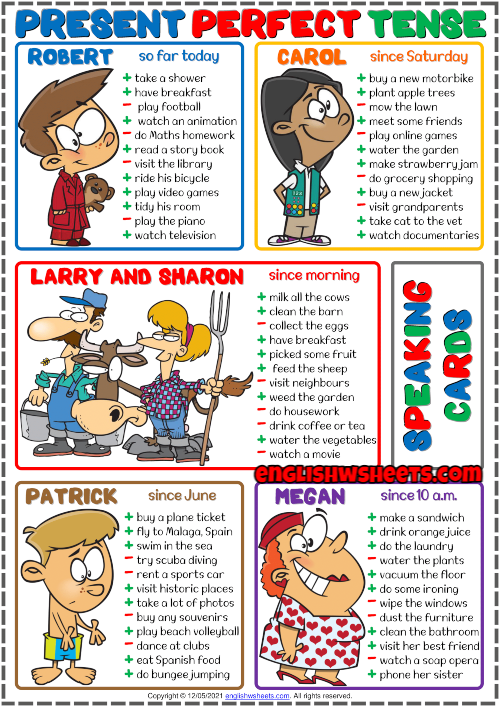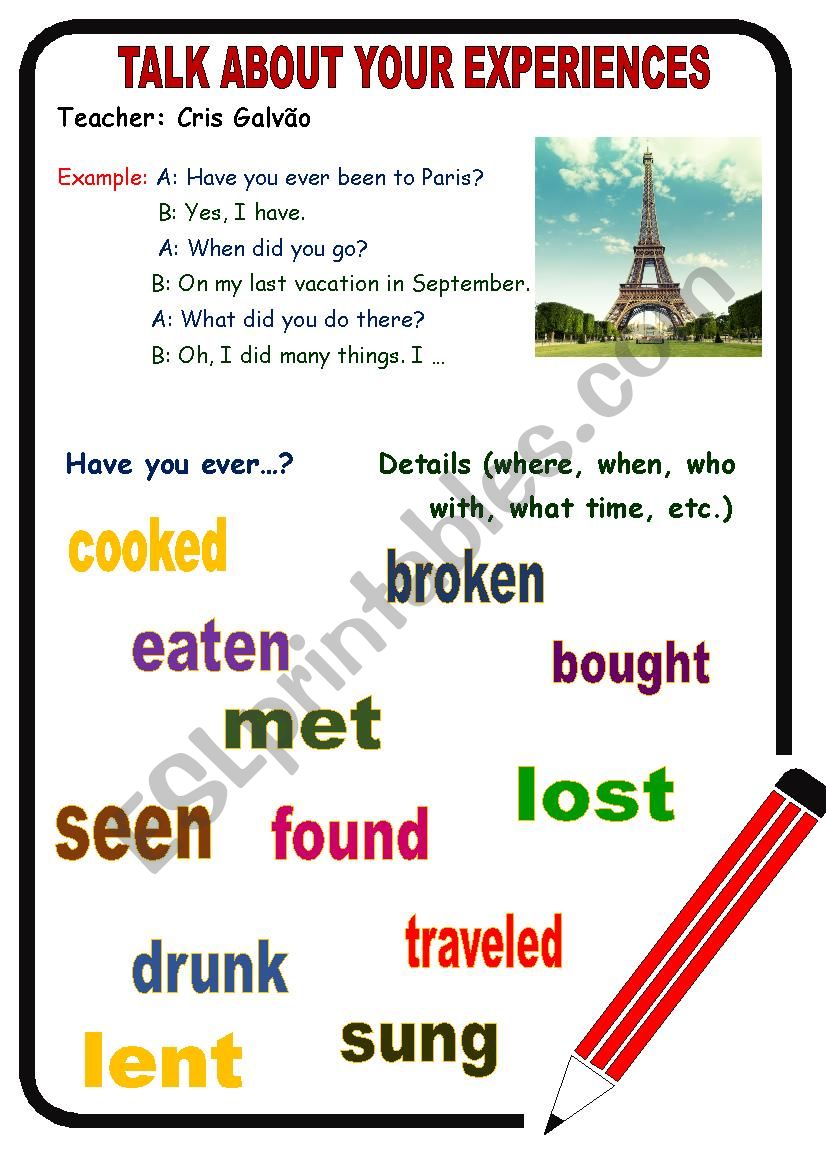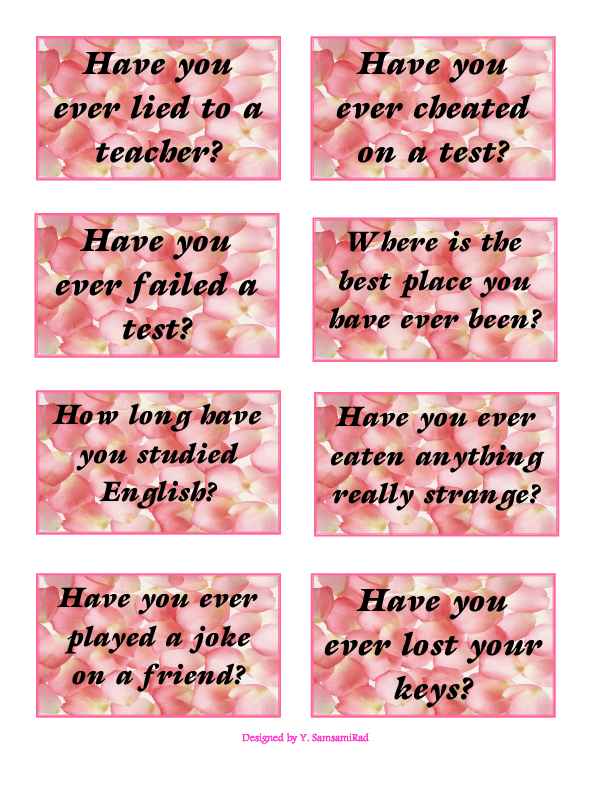
present perfect cards Juegos en ingles, Tiempos ingles, Educacion
PRESENT PERFECT - Speaking cards HappyNN 24658 255 243 0 1/1 Let's do English ESL vocabulary flashcards and dominoes. A set of cards to practise the Present Perfect Tense for your students. They work in pairs or groups an…

Present Perfect Tense ESL Printable Speaking Activity Cards
Here we have a list of present perfect conversation questions that can be used in 1 on 1 classes, as pair work, group work, or whole class speaking activities. The 75 questions all use the "Have you ever" form. There are also some pictures to match with the correct present perfect verbs. Students must find sentences with verbs that match.

PRESENT PERFECT Speaking cards English teaching materials, Speaking activities english
Present perfect 1 Present perfect 2 for something that happened in the past but is important in the present: I can't get in the house. I've lost my keys. Teresa isn't at home. I think she has gone shopping. Present perfect 3 Present perfect 4 have been and have gone We use have/has been when someone has gone to a place and returned:

YOU SPEAK PRESENT PERFECT / CONTINUOUS SIMPLE PAST Listen & Repeat SENTENCES YouTube
Perfect tenses Continuous (progressive) and emphatic tenses Compound continuous (progressive) tenses Conditional Imperative Subjunctive Note: One may encounter the archaic present tense forms thou speakest, thou speak'st, and thou speaketh, or the preterit forms thou spakest and I/she/he spake.

The Present Perfect Tense Mind Map
I worked every day this week. I have worked every day this week. We use the present perfect ( have worked) when we speak about an unfinished time period ( this week, this year, etc). Steven has wrote a new book. Steven has written a new book. We use the past participle of the verb - written is the past participle, wrote is the past simple.

Present Perfect Tense Definition, Useful Examples and Exercise ESL Grammar
Present I speak you speak he/she/it speaks we speak you speak they speak. Present Continuous. Present Perfect Continuous I have been speaking you have been speaking he/she/it has been speaking we have been speaking you have been speaking they have been speaking. Past

PRESENT PERFECT SPEAKING ACTIVITY ESL worksheet by crissorrir
Conjugation of Speak. Simple / Indefinite Present Tense. He/She/It speaks or ( archaic ) speaketh . I speak. You/We/They speak. Present Continuous Tense. He/She/It is speaking. I am speaking. You/We/They are speaking.

Present Perfect Speaking Cards
The present perfect tense is a combination of the present tense and perfect aspect that expresses an event in the past with consequences in the present. For this tense we use auxiliary verbs in their base form in combination with main verbs in their past participle form.This tense is quite easy to learn but harder to use in practice, but nonetheless it's a tense we must know.

present perfect cards Juegos en ingles, Frases en ingles, Tiempos ingles
428 8.4K views 2 weeks ago Learn how to use the present perfect tense correctly with this comprehensive video tutorial. This tutorial includes 100 example phrases to help you understand the.

Present perfect continuous — настоящее длительное совершенное время правила и примеры
Whether you have been learning English as an additional language or you are an English teacher, practicing or teaching speaking skills can be a challenge. That is why we created this list of ESL conversation questions in the present perfect. Use this list to master (or help your students master) this tense right now.

English Teaching Materials, Teaching English Grammar, English Grammar Worksheets, English
Conjugation of speak - English verb | PONS Verb Table for speak Continuous tenses Imperative Impersonal Simple tenses Present Past Present Perfect Past Perfect Will -Future Going to -Future Future Perfect Return to the dictionary Top of page Found an error? We appreciate your feedback. Click here! Continuous tenses Present Past Present Perfect

Present Perfect Tense Definition, Useful Examples and Exercise ESL Grammar
We also use present perfect when a period of time has not finished, it is still going on, like today, this week, this month, none of these have finished yet. For example: I have been so busy today! (today is still going, this is still the present moment) You have been so grumpy this week! (you started being grumpy in the past, earlier this week.

English Grammar, Conversation Practice Activity PRESENT SIMPLE, MiniConversations, http//www
To make the positive present perfect tense, use: 'have' / 'has' + the past participle. Make the past participle by adding 'ed' to regular verbs (for example, 'play' becomes 'played') There are a few verbs that change their spelling when you add 'ed' (for example, 'study' becomes 'studied') We also have some completely irregular verbs.

View Play Present Perfect Full Sado
Present Perfect Simple . Affirmative. I have spoken. You have spoken. We have spoken. He/She/It has spoken. You have spoken. They have spoken. Negative.. You have not been speaking. We have not been speaking. He/She/It has not been speaking. You have not been speaking. They have not been speaking. Interrogative.

Present Perfect ESL Conversation Questions [PDF] Speak English by Yourself learn anytime
This is a listening/speaking activity to help English language practice using "since" or "for". Students use the time cues in the pictures to write complete sentences in the the present perfect tense. Or use it as a listening exercise. Students listen to the audio and write appropriate sentences for the pictures. Since or far? Related Resources

PRESENT PERFECT Speaking cards worksheet Free ESL printable worksheets made by teachers
hablar; decir; intervenir;. Infinitive to speak Preterite spoke Past participle spoken Modelo : break Auxiliar : have, be Otras formas: speak oneself / not speak Contracciones Publicidad Indicative Present I speak you speak he/she/it speaks we speak you speak they speak Preterite I spoke you spoke he/she/it spoke we spoke you spoke they spoke